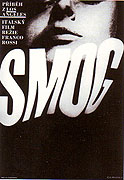
Regie:
Franco RossiKamera:
Ted D. McCordMusik:
Piero UmilianiBesetzung:
Annie Girardot, Enrico Maria Salerno, Renato Salvatori, John Phillip Law, Len Lesser, Loredana Nusciak, Graziella Granata, Howard KochKritiken (1)
The New World has aged, and it no longer surprises us. Kafka's “Amerika” knew that the fulfillment of the promise of classical modernity by embodying it in the United States only meant the birth of a "characterless" New Man, whose Disconnection with oneself and others accelerates movement in contrast to European apparent anchoring in the continuity of place. For example, when one of the authors of the “New Novel” also publishes his "study on the representation of the United States" in 1962, he calls it Mobile: Rossi thus joins the array of Europeans for whom the American way of life will equate to the depersonalization of broken human relationships, which, however, cannot help but sound like a traditional stating the alienation of the universal: the engine of modern life runs on idle. Traveling, conversations, good and sociological society, low and nocturnal, run in vain in the metaphor of a party of futility, whose representation has become a contemporary artistic figure that itself has experienced a shift from one character in film history to another: La Dolce Vita (1960), La Notte (1961), until Rossi moved it to North America in 1962, to end its journey in Eros (1964) of South America by Walter Hugo Khouri. Rossi's work stands out for its remarkable combination of narrative form, in the form of a constantly shifting road movie with characters passing by along the world's roadside, and content that reveals the emptiness of the American (and any other) dream.
()